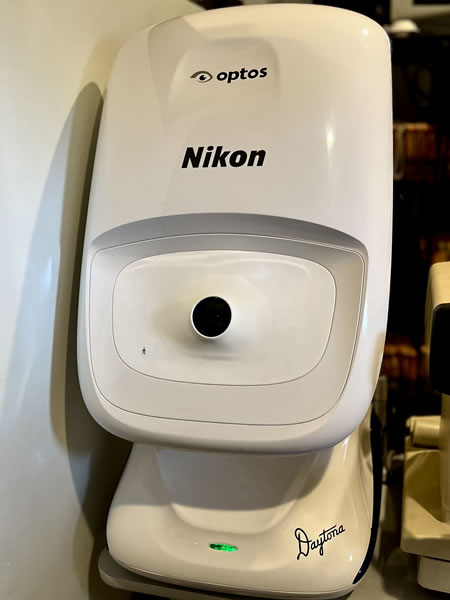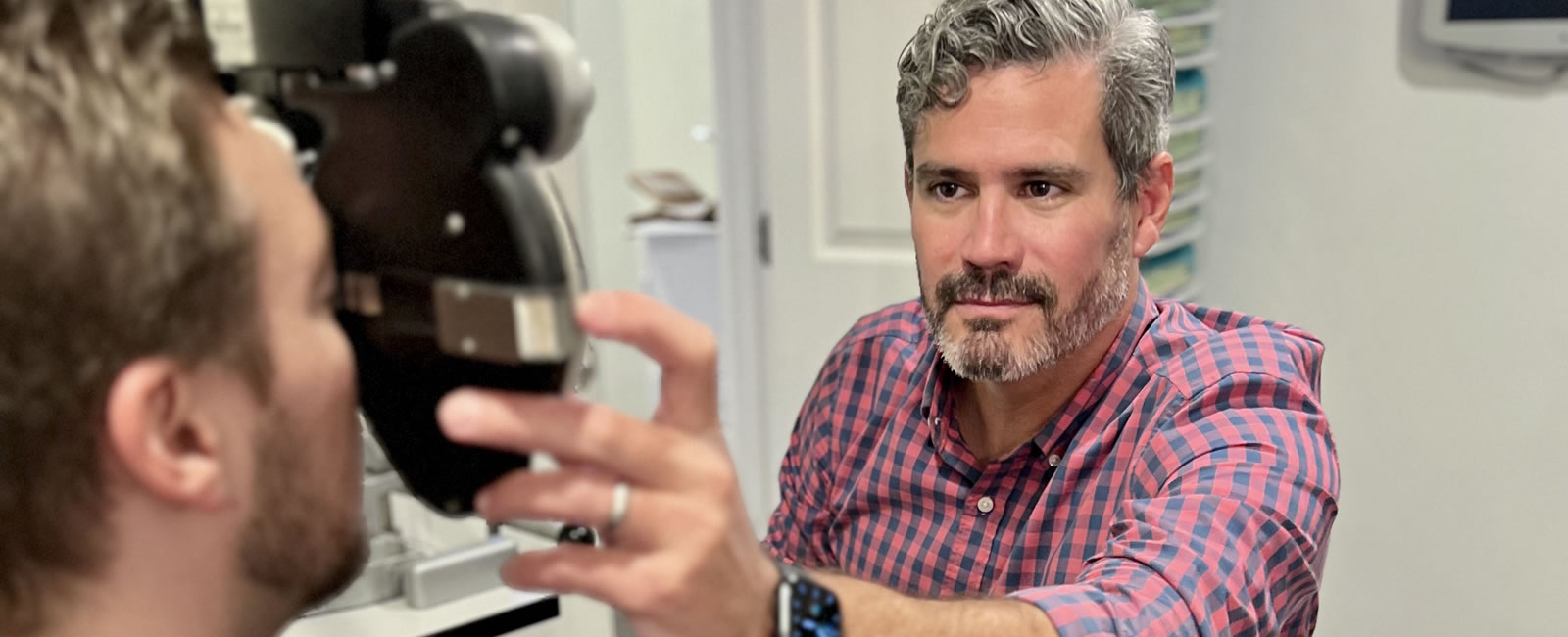
Comprehensive Eye Exams
Regardless of your age or physical health, it is important to have regular eye exams with Dr. Benjamin Gates, whether you are near-sighted, far-sighted, or even if you think you have perfect vision.
During a comprehensive eye exam, Dr. Gates will not only determine your prescription for eyeglasses or contact lenses, but will also check your eyes for common eye diseases, assess how your eyes work together as a team, and evaluate your eyes as an indicator of your overall health.
A comprehensive eye exam by Dr. Gates and Carytown Optometry includes a number of tests and procedures to examine and evaluate the health of your eyes and the quality of your vision. These tests range from simple ones, like having you read an eye chart, to complex tests, such as using a high-powered lens to examine the health of the tissues inside of your eyes and having an image taken of the inside of your eye.
Eye care experts recommend you have a complete eye exam every one to two years, depending on your age, risk factors, and physical condition.
What to Expect During Your Eye Exam
Annual eye exams are essential for protecting your vision and health. Before the exam, we will have you fill out a form asking a few questions about your vision history. If you currently wear contacts or glasses, it is a good idea to bring them to your appointment.
During your comprehensive eye exam by Dr. Gates, a series of tests are performed to assess your vision and the overall health of your eyes. The entire process takes anywhere from twenty minutes to over an hour, depending on the procedures that must be done to fully assess your vision. Here are some of the tests that you will likely encounter:
- Visual Acuity Test - Most people are familiar with the Snellen letter chart, which is used to check the sharpness of your vision. Dr. Gates will have you read letters of varying sizes from the chart to determine how well you can see them from across the room. To test your near vision, a smaller, hand-held chart is used. At Carytown Optometry, we have a state-of-the-art high-definition LED screen to test visual acuities.
- Cover Test - This simple test is used to see how well your eyes work together. Dr. Gates will have you focus on a small object, then he will alternately cover each eye.
- Color Blindness Test - Usually performed during your initial exam, this test will rule out color blindness. Although color blindness can be hereditary, the test can help your eye doctor rule out certain eye health problems.
- Auto-Refraction Test - During this test, you will be asked to look at an object in a machine. The machine will then take some measurements of your eye that will provide Dr. Gates with a “rough estimate” of your prescription.
- Refraction Test - During this procedure, Dr. Gates will ask you which lenses are clearer as different ones are placed in front of each eye. Your answers will help him refine the lens power and ultimately determine your final eyeglass prescription.
- iCare® Tonometry - This procedure allows Dr. Gates to check the pressures inside your eyes. High eye pressures can be associated with glaucoma. Before this test, Dr. Gates will determine the pressure using a small handheld tonometer. Other offices use the “puff test”. The procedure we use at Carytown Optometry is gentler than the puff test.
- Slit-Lamp Examination - The slit lamp is a microscope that enables your optometrist to look closely at both the external and internal structures of your eyes. Dr. Gates will have you place your chin on the chin rest, then shine the lamp's light into your eye. This highly magnified view will reveal signs of infection or disease.
- Optomap® – Widefield images of the retina and other structures of the inside of your eyes provide documentation of the health of your eyes and changes over time when compared to images taken at previous visits, Dr. Gates will show you the photographs and explain the findings to you. Dr. Gates considers this an essential test and performs it on every patient at every comprehensive exam.
Aside from these procedures, Dr. Gates may recommend that more specialized tests be performed.
Pediatric Patients
Dr. Gates sees patients as young as six years old (or possibly younger if they can identify all of the letters). It is important for school-aged children to have their eyes checked to ensure that there are no hidden issues, as many eye conditions that are less than obvious can go undetected in their annual pediatric physicals or school screenings.
Nearsightedness, also known as myopia, is one of the most common visual concerns among pediatric patients. It is a condition that often progresses over time and can lead to worsening vision, thicker glasses, and other concerns. Some of these other complications can be vision-threatening, such as retinal detachments and glaucoma. There have been numerous advances in options to prevent increasing nearsightedness and its accompanying complications in young people.
Two of the options Dr. Gates can use to prevent myopic progression are contact lenses and eye drops. Both have been proven safe and effective with high rates of success. Dr. Gates will discuss with the patient and their parents to determine which method would be best for your individual situation based on visual needs, cost, comfort, and personal preference. Dr. Gates is a certified provider of MiSight contact lenses.
